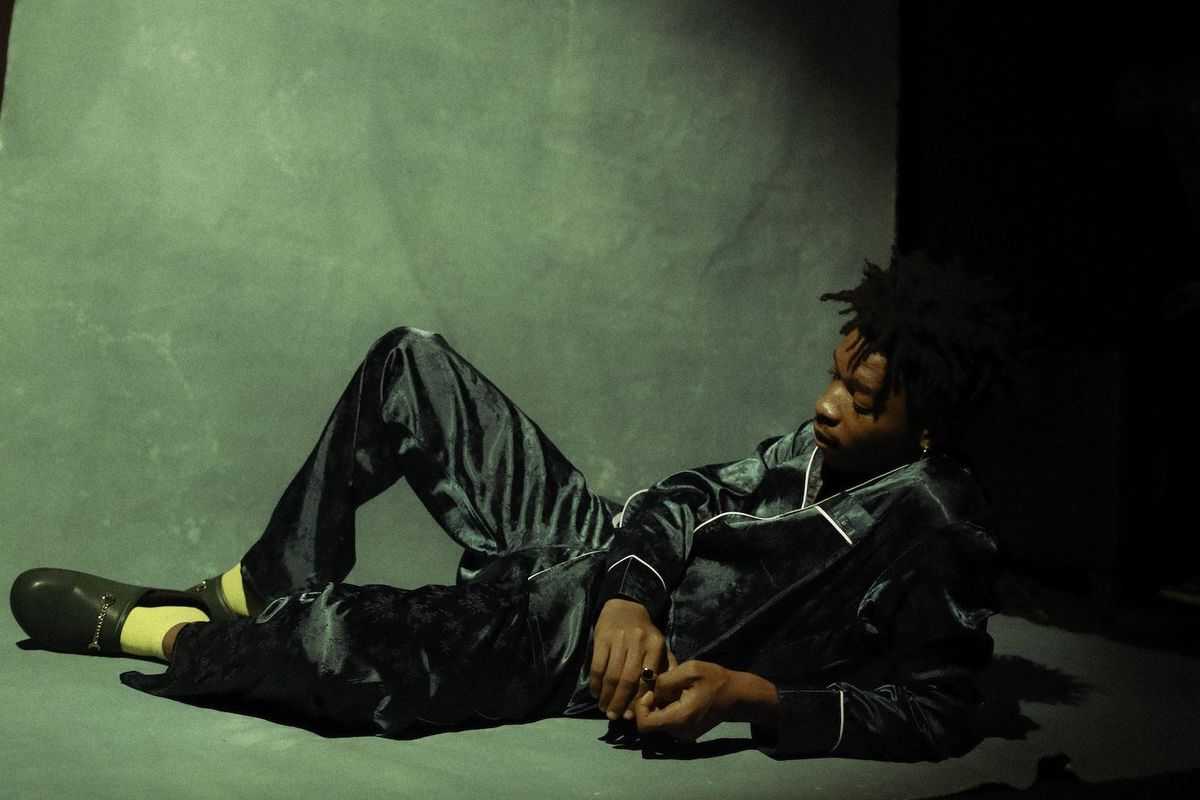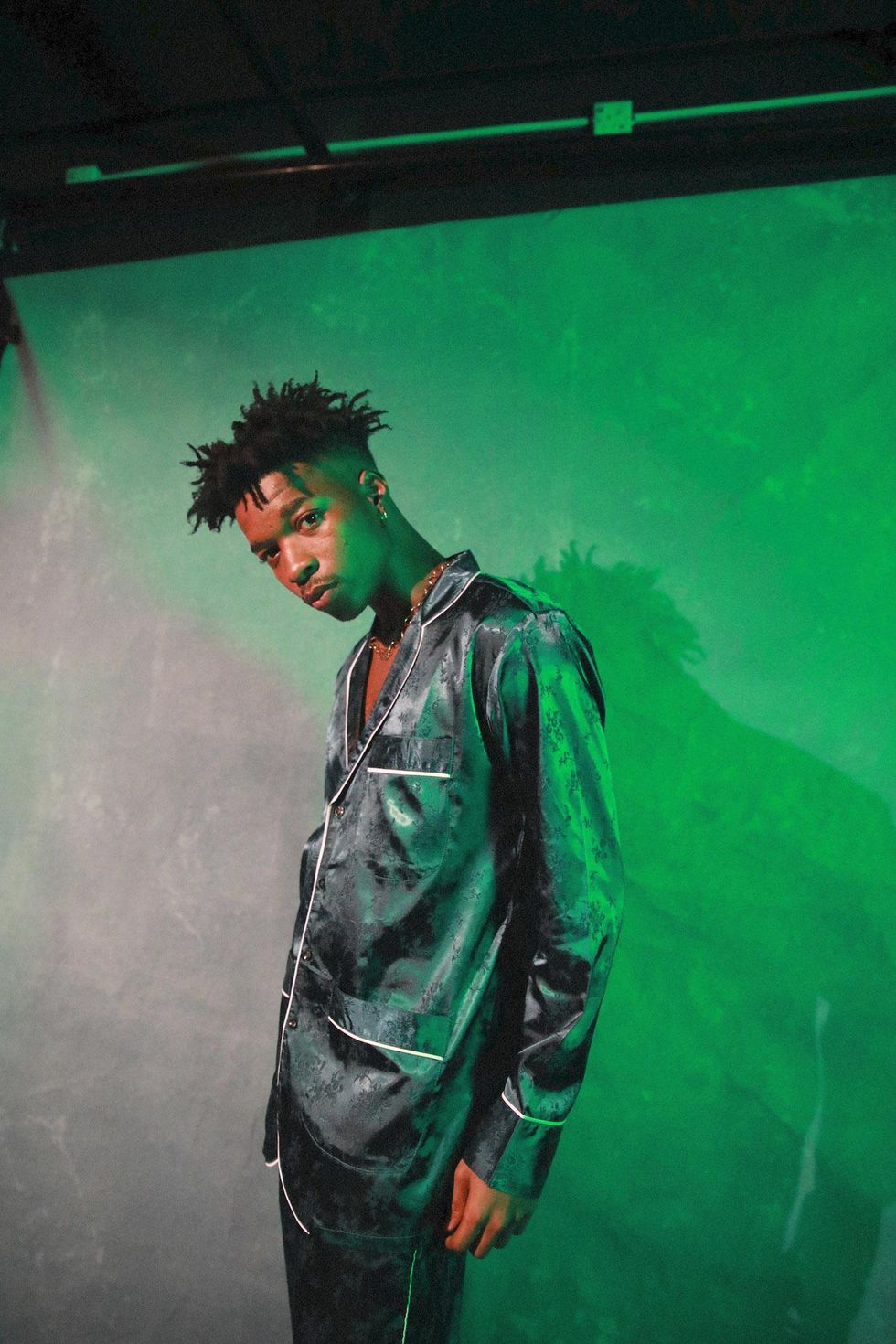Magixx Wants to Speak for a New Generation of Nigerians
The Mavin Records signee talks to us about his come-up, signing to Mavin Records and his debut self-titled EP.

Magixx.
The Nigerian dream is changing and its booming creative scene is spearheading a paradigm shift for young Nigerians looking to explore alternative career paths. Nigeria’s music industry in particular has become one of its biggest exports, fondly called ‘Nigeria’s new crude oil,’ it represents escapism for young Nigerians finding ways to thriving lives where their passions are put first, and the unconventional is conventional.
This is a new age embraced by 23-year-old Mavin Records star, Magixx, who always knew he wanted to chase his dream of being an artist, writing his first song at the age of nine. Magixx consistently pursued music-making and performing at school competitions, from high school to his college years, when he started to get acquainted with recognition and fame.
“I’d say I used my school as my hustling tool, because I used to perform at every show in school. Literally, like every show in school, you’d definitely see me there. That was how I spread my tentacles, how I met people that really put me on to people that changed my life to where I’m right now.”
Using modern marketing tools like Instagram, Magixx credits his success to social media, which allowed him to share freestyles to his growing fan base through his journey, giving him a stage to show his talent at next to no cost. While having to balance school, he never let go of his main goal and eventually that paid off when his big break came with Mavin Records. “Getting a call iin my final year was everything,” Magixx says.
With one of the biggest labels in Africa behind his back, a hit single off his debut project, and a growing fan base, Magixx aptly represents this new Nigerian dream. He talks to OkayAfrica about his early days, what his music means to him and why he believes he’s destined for this.

Image courtesy of Magixx.
Let's take it back to the beginning, how did growing up influence the artist that you are now?
I think growing up for me was one of the best parts of my entire life. I remember living with my mom and subsequently my grandma and grandpa, so most of my childhood I always had music around me, even when I was in my dad’s house. I basically spent my childhood between my grandma’s and my parents’. My dad used to have a lot of music playing in the house, Fela Kuti, DMX, Lagbaja, Celine Dion, Whitney Houston and a lot of R&B influences. I would go to church with my grandma and that’s where I picked up singing full time.
What’s your earliest memory of falling in love with music, and recording professionally?
Actually, like when I was 6, teachers would ask what we’d like to be when we grow up and I never for once thought of doing any other thing. I wrote my first song when I was 9, and recorded for the first time when I was 13. People I played my music for at that time encouraged me a lot, and I’d say it gave me more confidence. Recording in a studio cost a lot of money to me then but it was everything to me.
Can you take us through the timeline of getting signed to Mavin Records?
I was in the University of Lagos, in year three. During this period, more people started recognizing me, you know. But I've been putting out music myself since secondary school, but when I got to university, I got more recognition. I won a talent competition in my first year, which was the first big thing that caught people’s attention. I remember how much it took to balance school and my music.
I did a lot of freestyles on my Instagram ‘cause I feel like I'm one of those Instagram discovery guys. I had this little community of followers who were supporting me. The big break actually happened at the end of my final year. So you can imagine the rate of struggle you know, all the hustle that I've been putting in from my year one.
I feel like I used my school as my hustling tool because I used to perform at every show in school. Literally, like every show in school, you would definitely see me there. That was how I spread my tentacles, how I met people that really put me on to people that changed my life to where I’m right now. I remember finishing, my rent was about to expire because I was staying off-campus, it was like God’s timing and it was the timing for me you know.
I knew that Mass Comm. was a very good department, they support music, it’s like Radio and TV out there in Mass Comm. It was at the back of my mind that all of these things are still going to lead to music at the end of the day for me, you get. So getting a call for me here in my final year was everything. It was an exciting time.

Image courtesy of Magixx.
Take us through your process of creating the EP.
I feel it was really spiritual. I think most of the songs on that EP were like divine songs. There was no overthinking, I didn't stress to make the songs that you hear on that EP at all and the recordings were done over like 6 to 7 months. You know, I didn't know the exact time they were going to put me out so I just kept working. It was in a pandemic. So me. I was just recording, inward, just going in back to back. I remember coming in and there was y Ayra Starr, there was Boy Spyce, and there was me. We were just working, we didn't know who wass going next. Everybody was just working. I remember trying to show who I truly am on that project. So that was like my first project and there was no pressure
Can you tell us about “Love Don’t Cost A Dime” and why you decided to do a refix with Ayra Starr?
The feature with Ayra Starr was done ultimately to revive and also to add beauty to a song that we felt like could reach a bigger potential because, we knew that song had great potential from the start. We knew this song could cause damage. In fact, when I put out the freestyle on my Instagram, a lot of people wanted the song already. But me adding Ayra Starr was me adding color to the song. Of course, I reached out to other people also but Ayraa Starr was like the person that was down for it. So it was not like because she was my label mate or anything, it was just her availability and what she can add to the song. And also that sound, sound preference. So, she did what she did.
How would you describe the music you make and what you want your fans to feel from it?
Ultimately, I make music to actually change people’s lives. I feel like I'm a preacher, I feel I'm God sent. It's one thing to make music and it's one thing to make timeless music. And I think I'm part of the people that make timeless music. And I want my legacy to be that I actually impacted people's lives through my music you know, and
I want my music to speak for my whole generation and the people after it. Because music to me is like the record of the best times of our lives. I feel like music is attached to the best memories of our lives, so like remembering the timeline of our lives and you'll be like oh, so Chris Brown’s song was popular at the time. I want to create that with my music. I want a timeline with people's great memories.
How’s it been adjusting to fame. What's it been like being a mainstream artist going on the streets?
I think generally, it's positive and it also makes you see life differently. So when you are seeing life, you are not like an audience, you are like a giver. You are always taken from. So you tend to be like a tap for other people. So there is this re-adjustment. There is a way you have to position yourself you know. It has not been easy like being up to people’s expectations. Because now, whether you like it or not, people are expectant. So, some days I don't want to come outside, I have to sleep. Some nights I don't even want to go to the club. Adjusting to everything bit by bit, I won't say I'm there yet but I'm learning and I'm getting better in what I do.
Have you faced any challenges personally as you've been coming up and also do you feel any pressure as an up-anbd-coming artist rising in Africa’s global scene?
I think I've always anticipated it. I once feel the pressure to make international records. Like growing up I've always listened to Wizkid and Burna Boy, and I know the trajectory there must have going like ten years' time, like we would not have to think about making international records, it would just have to be a default thing. Do you understand? I think I'm prepared. I don’t feel there is any pressure to win any awards. The only thing that I would say is there is pressure to keep on making great music.
What can we expect from you moving forward?
Definitely great music. A lot of great music coming and the vision is clear, to leave an impact to make sure that my next man is eating fine and my brothers and sisters that are coming with me on this journey would have a good life at the end of the day. You understand it is family first.
Who would you like to work with? Anybody in Africa?
Magixx: Honestly, I've said Drake a lot of times. I think I would also like to work with Doja Cat, Future, this guy's inspired me a lot especially coming up as a young person. I feel like we share a lot, his R&B soul, he also raps and he likes to try a lot of things. My sound is diverse, a lot of people just know me and they think that's it. I think Nigerians are petty listeners. They don't really pay attention to the body of work. So people need to go back and listen to who Magixx is, and my trajectory to where I'm headed and to or headed from.Burna Boy and Wizkid. I would like to work with all these people.
- Mavins, Crayon, Ayra Starr, LADIPOE, Magixx & Boy Spyce ... ›
- Mavins, Crayon, Ayra Starr, LADIPOE, Magixx & Boy Spyce 'Overdose' ›
- Mavins, Crayon, Ayra Starr, LADIPOE, Magixx & Boy Spyce ... ›
- Mavin Records Introduces Newcomer Bayanni With New EP - OkayAfrica ›
- 8 Ayra Starr Looks That Prove She’s a Y2K Style Icon - OkayAfrica ›
- Magixx Explores the Motions of Heartbreak in New Single, “Winter & Summer” | OkayAfrica ›

